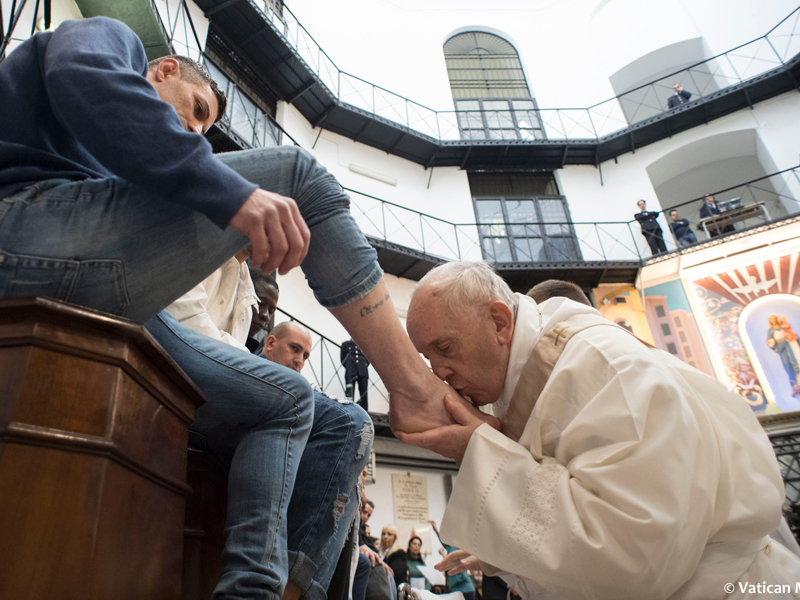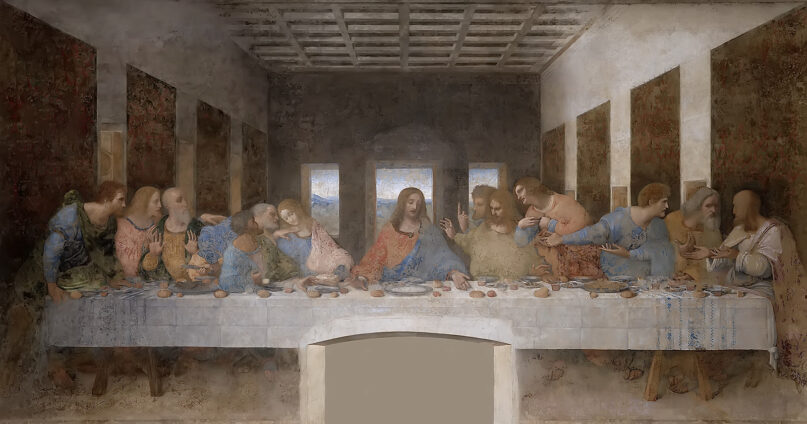(RNS) — On Passover, the youngest Jewish person at the Seder table traditionally asks, “Why is this night different from any other night?” It’s a question that every Christian child should ask on Holy Thursday, which comes midway through Holy Week’s commemorations of Jesus’ trial, death and resurrection.
An adult Christian might answer this question by saying that this is the night that we remember the Last Supper that Jesus had with his disciples before he died.
“So,” the children might reply, “why was this meal so important? Why do we go to church to remember it?”
For the early Christians, the death and resurrection of Jesus were experienced and explained through the symbols, ceremonies and history of the Jewish Passover. After all, the first Christians were Jews. Christians cannot understand the Eucharist unless they understand the Jewish Passover.
When the Hebrew people were enslaved in Egypt, God freed them and made a covenant with them whereby he would be their God and they would be his people.
This liberation from slavery and the establishment of the covenant is remembered and renewed in annual celebration of Passover in the Seder. At this meal, Jews remember their history as a people and retell the stories of their ancestors. Not only do they remember, they give thanks and praise to God for his actions on behalf of his people. Not only do they remember and give thanks, they also commit themselves once again to God’s covenant with his people.
We Christians also have a meal where we remember, give thanks and praise to God and renew God’s covenant with us. We call that meal the Eucharist.
It is a meal where we remember, where we tell stories from the past, most especially we tell stories about the life of Jesus and about the impact of his death and resurrection on the first Christians. We call these stories and remembrances the Gospels, which the early Christians added to the existing Jewish Scriptures.
RELATED: Holy Week pain, Easter hope in Ukraine
We not only remember, we also give thanks and praise to God in the Eucharistic prayer, the great prayer of thanks and praise that begins after the presentation of the bread and the wine. At the beginning of this prayer, the presider says, “Let us give thanks to the Lord our God,” and we answer, “It is right and just.”
We not only remember and give thanks and praise, we also renew God’s covenant with us. The bread we eat is the body of Christ, and the cup we drink is the new covenant in his blood, as St. Paul tells us. Every time we eat this bread and drink this cup, we proclaim the death of the Lord until he comes again. Through the Eucharist, we enter into the death and resurrection of Christ and renew his covenant.
On Holy Thursday, we especially remember the Last Supper that Jesus had with his disciples. At that last meal, although he knew that death was on the horizon, although he knew that Judas was to betray him, although he knew that the disciples would desert him, his concern was not for himself, but for his friends.
The covenant that he was establishing was a covenant of love. In this covenant, God first loves us and then asks for our love in return and asks that we love one another. Jesus not only taught this covenant of love, he lived it. In his love, we are able to see God’s love for us. In his love, we are able to see how we should love one another.

Pope Francis washes the feet of inmates on March 29, 2018, during his visit to the Regina Coeli detention center in Rome, where he celebrated the “Missa in Coena Domini.” Francis’ visit to a prison on Holy Thursday to wash the feet of some inmates stresses in a pre-Easter ritual that a pope must serve society’s marginalized and give them hope. (Vatican Media via AP)
In John’s account of the Last Supper, which is read during the Holy Thursday liturgy, the teacher, the Messiah, the Son of God, washes the feet of his disciples. He takes on the role of a servant or slave. He does this, not to embarrass the disciples, but to show them his love, just as he will continue to show his love as he journeys toward Calvary.
But what he does, he also does as an example. “If I washed your feet — I who am teacher and Lord — then you must wash each other’s feet.” He shows us how to live the covenant.
On Holy Thursday, we remember, we give thanks and praise, and we renew the covenant of love. The ceremony of the washing of feet symbolically expresses our willingness to imitate the loving service of Jesus, to imitate his willingness to forget his own fears and pain and to love and to forgive those who will desert him in his hour of need.
As we celebrate the Eucharist on Holy Thursday, we will give thanks and praise to God for sending Jesus, we will give thanks and praise for the last meal he had with his disciples, we will give thanks and praise to God for the Eucharist that Jesus gave us to do in remembrance of him.
RELATED: Why Holy Week is made for this pandemic
In this Eucharist, we renew the covenant of love. We do this with confidence because God has loved us first and has promised his Spirit, the Spirit of love, who will empower us to live lives of love as we proclaim the death of the Lord until he comes.
On Holy Thursday and at every Eucharist, we Christians, like our Jewish brothers and sisters at Passover, celebrate who we are.






